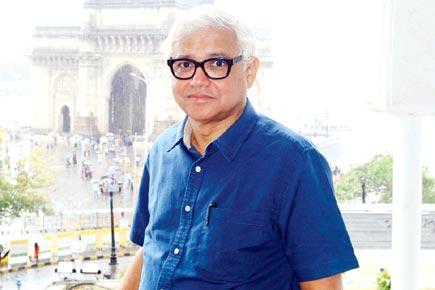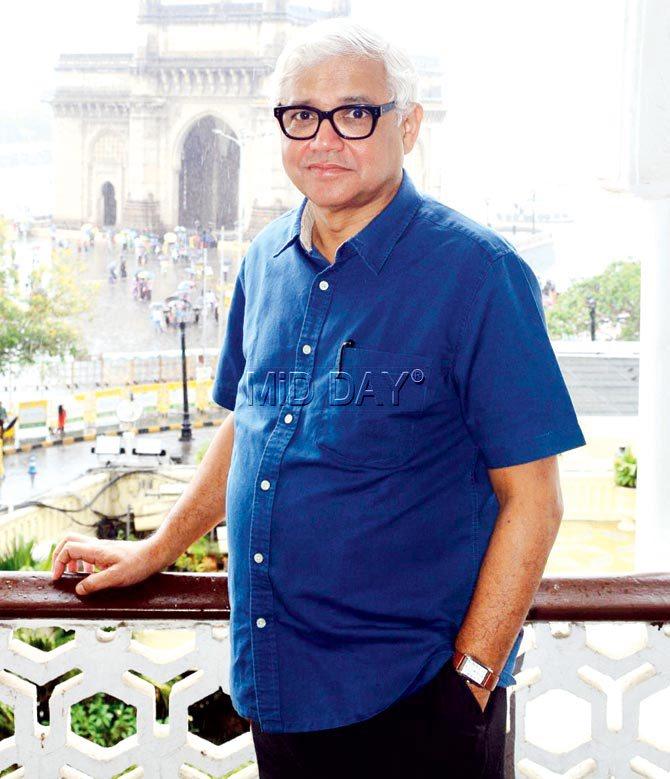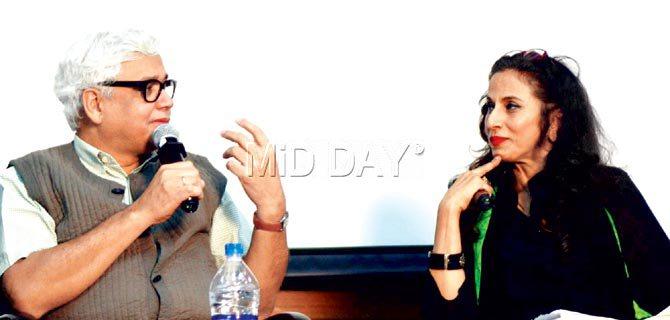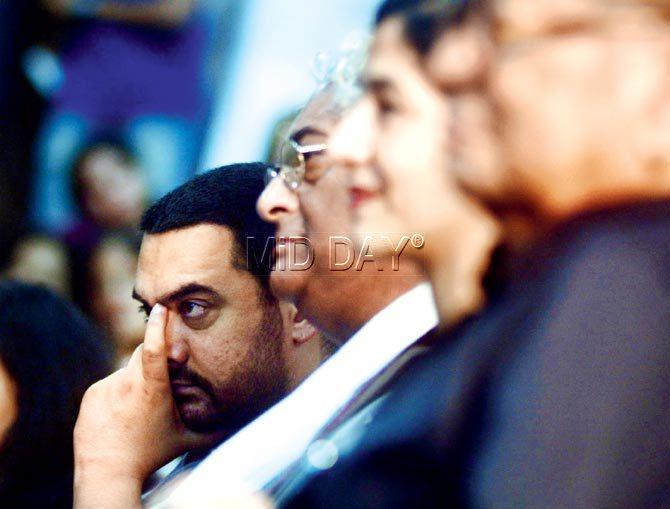Ships. Opium chests. Choppy waters. Warring continents. Flood of Fire, the much-awaited finale to the Ibis Trilogy is packed with all of the above, and much more. Recently, Amitav Ghosh gave Mumbai fans a taste of this heady adventure. Fiona Fernandez met with him to get the back-story of his epic work of historic fiction

Amitav Ghosh was in the city to launch the last book of his trilogy titled Flood of Fire
George Wittet's Gateway of India has a grey hue to it. After all, it's pouring outside. The monsoon is here, we're told. Call it timing or otherwise; we couldn't help but imagine similar brushstrokes paint a vivid picture from 1839-40, in the torrential waters around south China — the area where Amitav Ghosh's Flood of Fire ends in fine form.
Amitav Ghosh was in the city to launch the last book of his trilogy titled Flood of Fire. Pics/Bipin Kokate
ADVERTISEMENT
"Yes, River of Smoke was launched around this time, too," smiles Ghosh when we remind him of the monsoon connect. Our introductions revisited, we are ready to set sail. Pun intended. "I love being on water," when we prod early on, about why a ship forms such an integral part to the trilogy. "It's such a wonderful thing to write about. It provides you with classical elements like time, place and action. So much can happen in a concentration of space.
No wonder Agatha Christie wrote several titles centred on ships," he says, with a twinkle in his eye. Despite a packed, superhit launch (Aamir Khan was in the audience) the previous (Friday) evening, there's no trace of fatigue. This, even if we were to factor in an engaging one-hour interaction (Meeting Amitav Ghosh) with nine mid-day readers, barely an hour earlier.
Easing into the conversation, he's happy with the way the Ibis Trilogy turned out. "As I came to the end, it felt satisfying. I am glad with the way it worked itself out. I felt as if I was taking dictation from the book! It was on its own track," he quips, to which I ask, "…like a boatman?" Ghosh agrees, and we can gauge sea connect.
Celebrity Shobhaa De was in conversation with Amitav Ghosh, author of the Ibis Trilogy who wowed Mumbai fans at the launch of the final book in the trilogy, Flood of Fire (Penguin Random House)
Little wonder then, that when we speak a few moments later about the wondrous mix of languages and dialects in the trilogy, he shares about how nautical language was easy to incorporate — "I grew up in Sri Lanka, where it's spoken freely.
Sri Lanka (Ceylon) was an important stop for wayfarers and traders. Interestingly, I came across similar phraseology in Mauritius as well," he elaborates, helping me join the dots. By now, we're soaked in a socio-cultural lesson. The interview must make a re-entry, we realise, before our scheduled time slot runs out.
Of characters and challenges
So, we ask Ghosh to pick favourites from the trilogy. With a bunch of eclectic, insightful characters, each with their set of quirks, "It's tough for me," he grins. "They've all been difficult to create. A short pause later, he reveals, "Bahram Modi was a great challenge. He was a businessman from Bombay who was dealing with opium. I had to enter a world that I was not accustomed to.
It was a rewarding experience, especially from a sympathetic standpoint. In fact, he was the second character (Deeti was the first) that I thought of, when I began work on the trilogy. He has a very vivid presence, and is one of the most interesting characters in my entire writing life."
Held at at the National Gallery of Modern Art on Friday evening, the packed hall saw the likes of Chetan Bhagat and Aamir Khan in the audience
When we nudge a bit, on whether he missed Bahram in the final book, he adds, "He was there in spirit. But his wife Shireen was an interesting character as well. It's easy to relate to her, isn't it?" As we carry on our discussion of the book's central characters — Mr and Mrs Burnham, Zachary Reid, Havildar Kesri and Neel, it's insightful to listen to (and read, earlier) the wizardry with which the reader goes on a seamless ride that pans continents and cultures, separated by water.
"How do you manage to balance the pace of one story such that it doesn't outdo the other?" we quiz the Kolkata-born author. "Well, I wish I had the answer!" he shrugs, sharing a grin. "At some basic level, it's about instinct. Besides, while working on such a long book, one cannot merely depend on the flow."
Anybody who has read the trilogy will vouch for the imagery that takes over almost immediately. Like it did in our case. So when talk veers to these intrinsic elements to his craft, he replies, "I think in a visual way. To be able to write a scene, I need to see it. It's the best compliment if my reader can also do this, while reading it."
This, we were able to — from the moment we walked into our interview, forty minutes earlier, when dark clouds gathered over the Arabian Sea, in the picture postcard-like view from the hotel window.
Just as Ghosh had imagined, possibly, when Bahram, and later, Shireen had set sail, as they stood on the threshold of rewriting their destinies.
 Subscribe today by clicking the link and stay updated with the latest news!" Click here!
Subscribe today by clicking the link and stay updated with the latest news!" Click here!






